People
POSTDOCTORAL SCIENTISTS
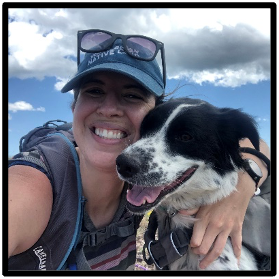
Dr. Jamie Peeler (she/her), post-doctoral scientist, 2021 - present
Dr. Jamie Peeler is a landscape ecologist dedicated to tackling forest conservation challenges in a more fire-prone world. Her interest in fire was originally sparked while working abroad in South Africa’s savannas. After returning to the United States, Jamie pursued research technician positions within hardwood forests in Minnesota, forested wetlands in Florida, and conifer forests in the Pacific Northwest. She experienced fire in many forms while working in these different ecosystems, including its potential to reshape forests dramatically. Her firsthand experiences ultimately inspired questions on fire, spatial pattern, and resilience that shaped her work in graduate school. In 2021, Jamie completed her Ph.D. in Geography from Penn State University. She is currently completing a postdoctoral fellowship as a NatureNet Science Fellow with The Nature Conservancy and the University of Montana.
Read more about Jamie's research in this story: UM postdoc studies 'opportunity hot spots' for reducing wildfire carbon loss.
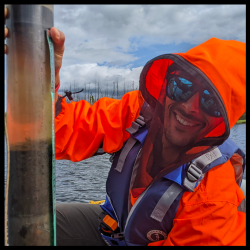 Dr. William "Buzz" Nanavati (he/him), postdoctoral research, 2023 - present
Dr. William "Buzz" Nanavati (he/him), postdoctoral research, 2023 - present
Dr. Buzz Nanavati studies how climate and humans interact to influence ecosystem dynamics, across broad spatial and temporal scales. Buzz’s work calls on the information preserved in lake and wetland sediments, including fossil pollen, charcoal, plant remains, and sedimentary DNA records. Buzz has worked throughout the Americas, including the Peruvian Andes, Argentine Patagonia, Missouri Ozarks, Oregon Cascades, and now boreal Alaska. His current research is part of the National Science Foundation-funded “Boreal Fire Feedbacks” project, where Buzz is examining how boreal forest ecosystems have responded to short-interval fires over the past 2,500 years. Buzz holds a B.A. in Spanish and B.S. in Anthropology from Southern Methodist University, an M.A. in Anthropology from Washington State University, and a Ph.D. in Ecology and Environmental Sciences from Montana State University.
GRADUATE STUDENTS
 Kyra Clark-Wolf (she/her), PhD candidate, 2017 - 2022
Kyra Clark-Wolf (she/her), PhD candidate, 2017 - 2022
Dr. Kyra Clark-Wolf is a paleoecologist and disturbance ecologist, working on postdoctoral research with the North Central Climate Adaptation Science Center at the University of Colorado Boulder. She is interested in understanding how disturbances like fire have shaped ecosystems in both historical and contemporary contexts. Her research spans various timescales, ranging from years to millennia, as she delves into the complex interactions among climate change, wildfires, and forests. Kyra's overarching goal is to unravel the mechanisms behind these interactions and explore how we can effectively steward changing ecosystems amidst the challenges of global environmental change.
In addition to her research endeavors, Kyra is passionate about teaching and outreach. She is committed to fostering broad engagement with science, aiming to inspire others to explore and appreciate the intricacies of the natural world. Through her dedication to education, Kyra seeks to empower individuals to become informed advocates for environmental conservation and sustainability.
Kyra earned her Ph.D. in the Systems Ecology Program at UM. Her research focused on investigating the causes and biogeochemical consequences of wildfires spanning the last 2,500 years in the Northern Rockies region, as part of the National Science Foundation-funded Big Burns Project. In October 2018, Kyra was honored with a Joint Fire Science Program Graduate Research Innovation (GRIN) fellowship, supporting her investigation into post-fire conifer regeneration following two significant wildfires that occurred during the regional fire year of 2017. Prior to her doctoral studies, Kyra graduated suma cum laude from Colorado College with a Bachelor of Arts degree in Environmental Science in 2016. Her academic achievements and dedication to understanding the complexities of wildfire ecology highlight her commitment to advancing knowledge in environmental science and contributing to solutions for sustainable ecosystem management.
Read more about her postdoctoral research in this press release: Subalpine forests in the Northern Rockies are fire resilient—for now (colorado.edu)
 Spencer Vieira (he/him), MS student, 2021 - 2023
Spencer Vieira (he/him), MS student, 2021 - 2023
Spencer earned his MS in the Systems Ecology Program at UM. He investigated climate-recruitment relationships of western larch seedlings following fire. In the spring of 2022 Spencer was awarded the Joint Fire Science Program Graduate Research Innovation (GRIN) fellowship and the NW Climate Adaptation Science Center (CASC) graduate fellowship to expand on his work with climate and wildfire effects on post-fire regeneration of western larch and the implications of climate change.
Prior to his time at UM, Spencer graduated from The Evergreen State College in Olympia, Washington, with a B.S. in Disturbance Ecology and Forest Management, in 2021. His past work as a Forestry Consultant for Northwest Natural Resource Group drives his interest in applied science for natural resource management and climate adaptation.
Learn more about Spencer's research in this article: Climate and Wildfire Effects on Post-Fire Regeneration of Western Larch (uw.edu).
UNDERGRADUATE STUDENTS
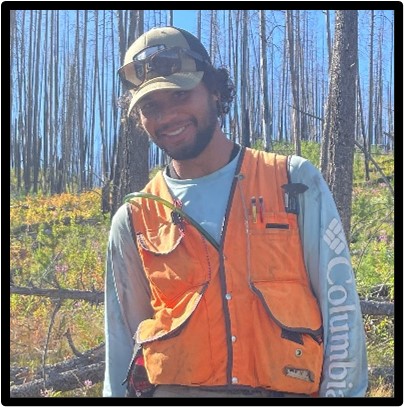 Junior Burks, undergraduate student, 2021 - present
Junior Burks, undergraduate student, 2021 - present
Junior is an undergraduate in the W. A. Franke College of Forestry and Conservation, majoring in Environmental Science and Sustainability and minoring in Climate Change Studies. Junior joined the lab in the summer of 2022 assisting in field work sampling post-fire regeneration of western larch (L. occidentalis) throughout the NW-US. Junior is using dendrochronological methods in the lab to determine the establishment year of seedlings collected in the field. This work is contributing to a study investigating climate-recruitment relationships of western larch seedlings following fire, linking science on natural regeneration to application for managed reforestation funded by NC/NW-Climate Adaptation Science Center and the Joint Fire Science Program.
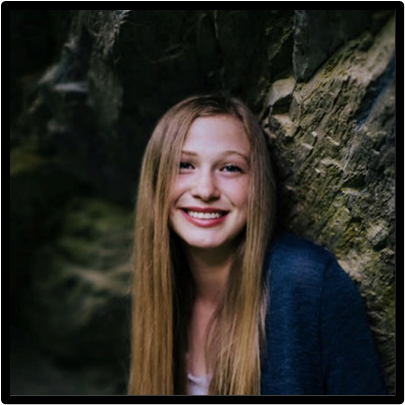 Abigail Sherwood (she/ her), undergraduate student, 2021 - present
Abigail Sherwood (she/ her), undergraduate student, 2021 - present
Abby is an undergraduate student in the W.A. Franke College of Forestry and Conservation, majoring in Environmental Science and Sustainability. Abby joined the lab during the autumn semester of 2022 after a summer internship with the Dept. of Interior’s Office of Wildland Fire as part of the University of Montana’s Demmer Scholars Program. Since joining the lab she has begun assisting with research examining post-fire tree regeneration of western larch (L. occidentalis) across NW-US. Abby is using dendrochronological methods in the lab to determine the establishment year of seedlings collected in the field. This work is contributing to a study investigating climate-recruitment relationships of western larch seedlings following fire, linking science on natural regeneration to application for managed reforestation funded by NC/NW-Climate Adaptation Science Center and the Joint Fire Science Program.
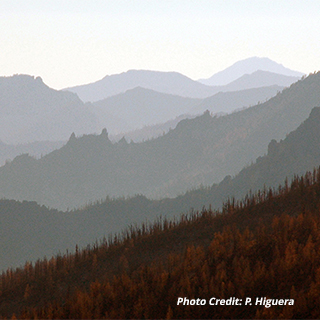
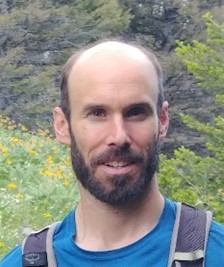 Philip Higuera, Professor (he/him)
Philip Higuera, Professor (he/him)